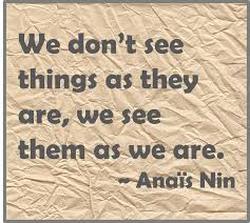
Ten people could watch an event, like a robbery for example, and their stories will all be unique in some way. One person may notice the clothes the robber is wearing - perhaps they own or know someone who wears that particular style or brand. Another may see the expression on the face of the robber and identify with it in some way - are they also feeling threatened or angry right now? Yet another may be aware of the type of car that was driven - perhaps its one they would love to own, or maybe the opposite is true.
When you talk to these people they remember the feelings they were experiencing at that time, and it affects their account of the story. If you asked them a year later, perhaps even sooner, while they were in a totally different emotional 'space', they would tell the story a little differently.
And this is how it is with events and situations that have affected us, especially within interactions that involve family members or friends. Our mind has this awesome ability to 'delete' the parts it doesn't like, e.g. perhaps we didn't behave the way we should, or the other person hurt us beyond belief. It can also 'distort' some portions of the event or situation to either match our current emotional way of being, or it can make one of the 'parties' look less innocent, more wholesome, meaner, kinder, violent, calm, etc. On top of that we have our handy built in 'event filter' that can change the whole situation by removing a specific emotional charge or changing the manner in which the event/situation was played out.
Our brains do this for a variety of reasons. It can be a self protection or preservation technique...or it can be because we have re-hashed over it so many times, we no longer know what the original story is anymore.
For you see, every time we re-think or re-create in our mind the turn of events or what was said, our brain changes it ever so slightly. The story can be changed to set our current mood, so we see only the positive within what took place...or it can focus on the negative, distorting it, so it seems much harsher than it really was. In a way its like Chinese whispers, but the difference is that the change is so incremental and tiny, we don't often recognise that our perception of the story has changed. Lets face it, our brain/mind wants us to think the best of us, so it may paint us as the hero or the victim in the story, instead of remembering that there is no event that hasn't occurred without an equal dose of action and re-action.
However, our ego may want us to feel belittled, mean and sad, so it will play the opposite tune, telling us that everything we did was wrong, and everyone else was in the right.
...and the problem is that neither retelling of the story is true. There is no right way to retell it, just as there is no wrong. There is only perception .
Next time you are recalling a past event or over-thinking something someone said or did; or perhaps someone is doing this to you, trying to tell you that you behaved in a way that you don't remember....it could be that your (or their) perception has changed, and it may not be as definitive as they (or you) are saying/thinking/believing. If it doesn't feel right, don't own it just because someone said so.
In saying that, let me hasten to add that there are some events that happen in our lifetime that are life changing and unforgettable..and no matter of distorting, deleting or filtering will change that - but there may be miniscule details that will have morphed in some way. That is just how our minds are set up...and ,as I said, sometimes it protects us, but sometimes it hurts us.....
Try this experiment: Think of an event that happened today and write all about it. Use your emotions while you do so and explain it as fully as you can, including facial expressions, tones of voice, etc. In a weeks time, without looking at what you wrote, write about the same event. Do it again in another weeks time, and so on. Try doing it when you are angry; when you are sad; when you are happy, well you get the general idea. In three months time, read all of those accounts of the situation and notice the difference between them all. This is a great lesson in perception and how our mind alters things 'below the surface'.
An even better experiment is to get someone else who will do the same as you do about an event/situation you were both a party to. When you compare notes, trust me, you will be quite surprised...
with love, respect and integrity,
Cherie xx
 RSS Feed
RSS Feed
